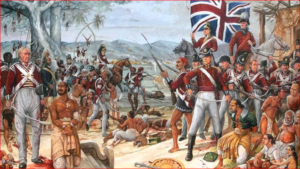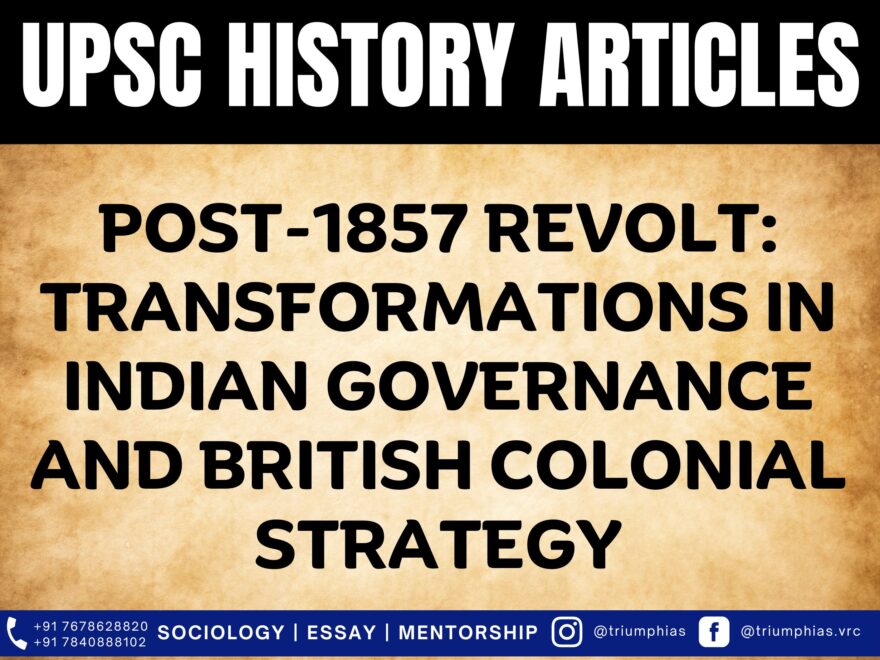Post 1857 Revolt
(Relevant for Historical Section of General Studies Paper Prelims/Mains)

Post 1857 Revolt
The considerable support which the revolt of 1857 obtained and the threat it posed to the very existence of British rule in India, forced the British to examine the entire nature of their connection with India.
The repercussions of the Revolt of 1857 can be categorized into several aspects, including:
- Administrative Transformations Following the Government of India Act 1858, control over India was shifted from the East India Company to the British Crown. The authority previously held by the Company’s directors and the Board of Control was now vested in the Secretary of State for India, assisted by a Council.
- The Act of 1858 introduced the concept of an Executive Council under the Governor-General, with its members serving as heads of various departments and official advisors.
- Provincial Governance The Act of 1861 marked a shift away from centralization. It stipulated the establishment of legislative councils similar to the central one, initially in Bombay, Madras, and Bengal, and later in other provinces.
- In 1870, under Lord Mayo’s administration, provincial governments received fixed allocations from central revenues for services like police, jails, education, medical facilities, and roads. They were given autonomy in managing these services.
- In 1877, Lord Lytton delegated certain additional areas of expenditure, including Land Revenue, Excise, General Administration, and Law and Justice, to the provinces.
- In 1882, all sources of revenue were categorized into three segments: general, provincial, and those to be shared between the central and provincial governments.
- Local Governance The government promoted local governance through municipalities and district boards, further decentralizing administration.
- Local services such as education, health, sanitation, and water supply were entrusted to local bodies, financed through local taxes.
- The Ripon resolution of 1882 outlined the policy of entrusting local affairs primarily to local bodies, a majority of whose members were to be non-officials. However, these bodies functioned under government control, essentially as government departments.
- Public Services The maximum age for entry into the civil service was progressively reduced from 23 in 1859 to 19 in 1878.
- Under Indian pressure, various administrative services began to be gradually Indianite after 1918. However, British authorities retained control and authority.
- It became evident that the Indenisation of these services did not transfer any political power to Indians. Those serving in these roles essentially acted as agents of British rule, faithfully advancing Britain’s imperial objectives.
A new phase of history began after 1857, the government policies were put in place to ensure that another rebellion does not break out, on the other hand and the government also strengthened the administrative institutions in the country.
Sample Question for UPSC Sociology Optional Paper:
1. Question: How did the Revolt of 1857 impact the British administration in India?
Answer:
The Revolt of 1857 led to significant administrative transformations, including the shift of control from the East India Company to the British Crown and the decentralization of governance to the provincial and local levels.
2. Question: What were the major changes introduced by the Government of India Act 1858?
Answer:
The Act transferred control of India from the East India Company to the British Crown and established an Executive Council under the Governor-General, shifting the authority from Company directors and the Board of Control.
3. Question: What role did local governance play post-1857 Revolt?
Answer:
Post-1857, local governance was promoted through municipalities and district boards, with local services like education and health being entrusted to these local bodies.
4. Question: How did the provincial governance evolve after the 1857 Revolt?
Answer:
Post-1857, provincial governance was decentralized, with fixed allocations for various services like police and education. Additional areas of expenditure were also delegated to the provinces over time.
5. Question: Did Indianisation of administrative services after 1918 transfer any political power to Indians?
Answer:
No, the Indianisation of administrative services did not transfer political power to Indians; those serving in these roles essentially acted as agents of British rule.
To master these intricacies and fare well in the Sociology Optional Syllabus, aspiring sociologists might benefit from guidance by the Best Sociology Optional Teacher and participation in the Best Sociology Optional Coaching. These avenues provide comprehensive assistance, ensuring a solid understanding of sociology’s diverse methodologies and techniques.
1857 Revolt, British rule in India, Government of India Act 1858, Governor-General, Provincial Governance, Local Governance, Executive Council, Indian Civil Service, Indianisation, 1857 Revolt, British rule in India, Government of India Act 1858, Governor-General, Provincial Governance, Local Governance, Executive Council, Indian Civil Service, Indianisation
Choose The Best Sociology Optional Teacher for IAS Preparation?
At the beginning of the journey for Civil Services Examination preparation, many students face a pivotal decision – selecting their optional subject. Questions such as “which optional subject is the best?” and “which optional subject is the most scoring?” frequently come to mind. Choosing the right optional subject, like choosing the best sociology optional teacher, is a subjective yet vital step that requires a thoughtful decision based on facts. A misstep in this crucial decision can indeed prove disastrous.
Ever since the exam pattern was revamped in 2013, the UPSC has eliminated the need for a second optional subject. Now, candidates have to choose only one optional subject for the UPSC Mains, which has two papers of 250 marks each. One of the compelling choices for many has been the sociology optional. However, it’s strongly advised to decide on your optional subject for mains well ahead of time to get sufficient time to complete the syllabus. After all, most students score similarly in General Studies Papers; it’s the score in the optional subject & essay that contributes significantly to the final selection.
“A sound strategy does not rely solely on the popular
Opinion of toppers or famous YouTubers cum teachers.”
It requires understanding one’s ability, interest, and the relevance of the subject, not just for the exam but also for life in general. Hence, when selecting the best sociology teacher, one must consider the usefulness of sociology optional coaching in General Studies, Essay, and Personality Test.
The choice of the optional subject should be based on objective criteria, such as the nature, scope, and size of the syllabus, uniformity and stability in the question pattern, relevance of the syllabic content in daily life in society, and the availability of study material and guidance. For example, choosing the best sociology optional coaching can ensure access to top-quality study materials and experienced teachers. Always remember, the approach of the UPSC optional subject differs from your academic studies of subjects. Therefore, before settling for sociology optional, you need to analyze the syllabus, previous years’ pattern, subject requirements (be it ideal, visionary, numerical, conceptual theoretical), and your comfort level with the subject.
This decision marks a critical point in your UPSC – CSE journey, potentially determining your success in a career in IAS/Civil Services. Therefore, it’s crucial to choose wisely, whether it’s the optional subject or the best sociology optional teacher. Always base your decision on accurate facts, and never let your emotional biases guide your choices. After all, the search for the best sociology optional coaching is about finding the perfect fit for your unique academic needs and aspirations.
To master these intricacies and fare well in the Sociology Optional Syllabus, aspiring sociologists might benefit from guidance by the Best Sociology Optional Teacher and participation in the Best Sociology Optional Coaching. These avenues provide comprehensive assistance, ensuring a solid understanding of sociology’s diverse methodologies and techniques. Sociology, Social theory, Best Sociology Optional Teacher, Best Sociology Optional Coaching, Sociology Optional Syllabus.
Best Sociology Optional Teacher, Sociology Syllabus, Sociology Optional, Sociology Optional Coaching, Best Sociology Optional Coaching, Best Sociology Teacher, Sociology Course, Sociology Teacher, Sociology Foundation, Sociology Foundation Course, Sociology Optional UPSC, Sociology for IAS,
Follow us :
🔎 https://www.instagram.com/triumphias
🔎https://www.youtube.com/c/TriumphIAS
https://t.me/VikashRanjanSociology
Find More Blogs
|
Scope of the subject and comparison with other social sciences |
|||
|
|
|
|
Modernity and social changes in Europe |

